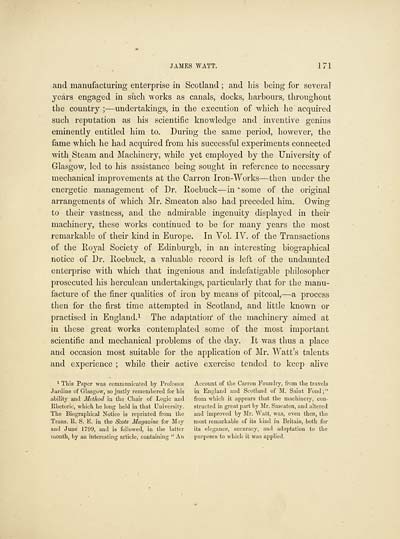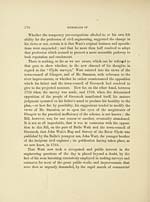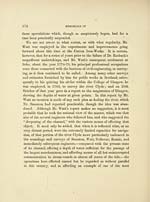Memorials of the lineage, early life, education and development of the genius of James Watt
(203) Page 171
Download files
Complete book:
Individual page:
Thumbnail gallery: Grid view | List view

JAMES WATT. 171
and manufacturing enterprise in Scotland ; and his being for several
years engaged in such works as canals, docks, harbours, throughout
the country ; — undertakings, in the execution of which lie acquired
such reputation as his scientific knowledge and inventive genius
eminently entitled him to. During the same period, however, the
fame which he had acquired from his successful experiments connected
with Steam and Machinery, while yet employed by the University of
Glasgow, led to his assistance being sought in reference to necessary
mechanical improvements at the Carron Iron- Works — then under the
energetic management of Dr. Roebuck — in "some of the original
arrangements of which Mr. Smeaton also had preceded him. Owing
to their vastness, and the admirable ingenuity displayed in their
machinery, these works continued to be for many years the most
remarkable of their kind in Europe. In Vol. IV. of the Transactions
of the Ro} r al Society of Edinburgh, in an interesting biographical
notice of Dr. Roebuck, a valuable record is left of the undaunted
enterprise with which that ingenious and indefatigable philosopher
prosecuted his herculean undertakings, particularly that for the manu-
facture of the finer qualities of iron by means of pitcoal, — a process
then for the first time attempted in Scotland, and little known or
practised in England. 1 The adaptation' of the machinery aimed at
in these great works contemplated some of the most important
scientific and mechanical problems of the day. It was thus a place
and occasion most suitable for the application of Mr. Watt's talents
and experience ; while their active exercise tended to keep alive
1 This Paper was communicated by Professor Account of the Carron Foundry, from the travels
Jardine of Glasgow, so justly remembered for his in England and Scotland of M. Saint Fond;"
ability and Method in the Chair of Logic and from which it appears that the machinery, con-
Ehetoric, which he long held in that University. structed in great part by Mr. Smeaton, and altered
The Biographical Notice is reprinted from the and improved by Mr. Watt, was, even then, the
Trans. E. S. E. in the Scots Magazine for May most remarkable of its kind in Britain, both for
and June 1799, and is followed, in the latter its elegance, accuracy, and adaptation to the
month, by an interesting article, containing " An purposes to which it was applied.
and manufacturing enterprise in Scotland ; and his being for several
years engaged in such works as canals, docks, harbours, throughout
the country ; — undertakings, in the execution of which lie acquired
such reputation as his scientific knowledge and inventive genius
eminently entitled him to. During the same period, however, the
fame which he had acquired from his successful experiments connected
with Steam and Machinery, while yet employed by the University of
Glasgow, led to his assistance being sought in reference to necessary
mechanical improvements at the Carron Iron- Works — then under the
energetic management of Dr. Roebuck — in "some of the original
arrangements of which Mr. Smeaton also had preceded him. Owing
to their vastness, and the admirable ingenuity displayed in their
machinery, these works continued to be for many years the most
remarkable of their kind in Europe. In Vol. IV. of the Transactions
of the Ro} r al Society of Edinburgh, in an interesting biographical
notice of Dr. Roebuck, a valuable record is left of the undaunted
enterprise with which that ingenious and indefatigable philosopher
prosecuted his herculean undertakings, particularly that for the manu-
facture of the finer qualities of iron by means of pitcoal, — a process
then for the first time attempted in Scotland, and little known or
practised in England. 1 The adaptation' of the machinery aimed at
in these great works contemplated some of the most important
scientific and mechanical problems of the day. It was thus a place
and occasion most suitable for the application of Mr. Watt's talents
and experience ; while their active exercise tended to keep alive
1 This Paper was communicated by Professor Account of the Carron Foundry, from the travels
Jardine of Glasgow, so justly remembered for his in England and Scotland of M. Saint Fond;"
ability and Method in the Chair of Logic and from which it appears that the machinery, con-
Ehetoric, which he long held in that University. structed in great part by Mr. Smeaton, and altered
The Biographical Notice is reprinted from the and improved by Mr. Watt, was, even then, the
Trans. E. S. E. in the Scots Magazine for May most remarkable of its kind in Britain, both for
and June 1799, and is followed, in the latter its elegance, accuracy, and adaptation to the
month, by an interesting article, containing " An purposes to which it was applied.
Set display mode to:
![]() Universal Viewer |
Universal Viewer | ![]() Mirador |
Large image | Transcription
Mirador |
Large image | Transcription
Images and transcriptions on this page, including medium image downloads, may be used under the Creative Commons Attribution 4.0 International Licence unless otherwise stated. ![]()
| Histories of Scottish families > Memorials of the lineage, early life, education and development of the genius of James Watt > (203) Page 171 |
|---|
| Permanent URL | https://digital.nls.uk/95171890 |
|---|
| Description | A selection of almost 400 printed items relating to the history of Scottish families, mostly dating from the 19th and early 20th centuries. Includes memoirs, genealogies and clan histories, with a few produced by emigrant families. The earliest family history goes back to AD 916. |
|---|

